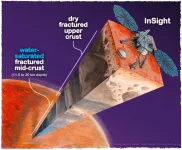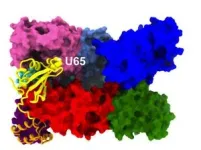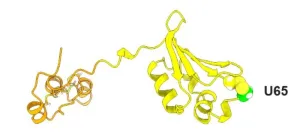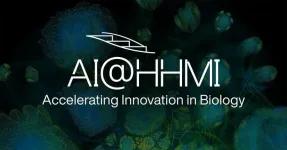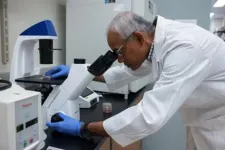(Press-News.org) Using seismic activity to probe the interior of Mars, geophysicists have found evidence for a large underground reservoir of liquid water — enough to fill oceans on the planet's surface.
The data from NASA's Insight lander allowed the scientists to estimate that the amount of groundwater could cover the entire planet to a depth of between 1 and 2 kilometers, or about a mile.
While that’s good news for those tracking the fate of water on the planet after its oceans disappeared more than 3 billion years ago, the reservoir won't be of much use to anyone trying to tap into it to supply a future Mars colony. It's located in tiny cracks and pores in rock in the middle of the Martian crust, between 11.5 and 20 kilometers below the surface. Even on Earth, drilling a hole a kilometer deep is a challenge.
The finding does pinpoint another promising place to look for life on Mars, however, if the reservoir can be accessed. For the moment, it helps answer questions about the geological history of the planet.
“Understanding the Martian water cycle is critical for understanding the evolution of the climate, surface and interior,” said Vashan Wright, a former UC Berkeley postdoctoral fellow who is now an assistant professor at UC San Diego’s Scripps Institution of Oceanography. “A useful starting point is to identify where water is and how much is there.”
Wright, alongside colleagues Michael Manga of UC Berkeley and Matthias Morzfeld of Scripps Oceanography, detailed their analysis in a paper that will appear this week in the journal Proceedings of the National Academy of Sciences.
The scientists employed a mathematical model of rock physics, identical to models used on Earth to map underground aquifers and oil fields, to conclude that the seismic data from Insight are best explained by a deep layer of fractured igneous rock saturated with liquid water. Igneous rocks are cooled hot magma, like the granite of the Sierra Nevada.
"Establishing that there is a big reservoir of liquid water provides some window into what the climate was like or could be like," said Manga, a UC Berkeley professor of earth and planetary science. "And water is necessary for life as we know it. I don't see why [the underground reservoir] is not a habitable environment. It's certainly true on Earth — deep, deep mines host life, the bottom of the ocean hosts life. We haven't found any evidence for life on Mars, but at least we have identified a place that should, in principle, be able to sustain life."
Manga was Wright's postdoctoral adviser. Morzfeld was a former postdoctoral fellow in UC Berkeley’s mathematics department and is now an associate professor of geophysics at Scripps Oceanography.
Manga noted that lots of evidence — river channels, deltas and lake deposits, as well as water-altered rock — supports the hypothesis that water once flowed on the planet's surface. But that wet period ended more than 3 billion years ago, after Mars lost its atmosphere. Planetary scientists on Earth have sent many probes and landers to the planet to find out what happened to that water — the water frozen in Mars' polar ice caps can't account for it all — as well as when it happened, and whether life exists or used to exist on the planet.
The new findings are an indication that much of the water did not escape into space but filtered down into the crust.
The Insight lander was sent by NASA to Mars in 2018 to investigate the crust, mantle, core and atmosphere, and it recorded invaluable information about Mars' interior before the mission ended in 2022.
"The mission greatly exceeded my expectations," Manga said. "From looking at all the seismic data that Insight collected, they've figured out the thickness of the crust, the depth of the core, the composition of the core, even a little bit about the temperature within the mantle."
Insight detected Mars quakes up to about a magnitude of 5, meteor impacts and rumblings from volcanic areas, all of which produced seismic waves that allowed geophysicists to probe the interior.
An earlier paper reported that above a depth of about 5 kilometers, the upper crust did not contain water ice, as Manga and others suspected. That may mean that there's little accessible frozen groundwater outside the polar regions.
The new paper analyzed the deeper crust and concluded that the "available data are best explained by a water-saturated mid-crust" below Insight’s location. Assuming the crust is similar throughout the planet, the team argued, there should be more water in this mid-crust zone than the "volumes proposed to have filled hypothesized ancient Martian oceans."
The Canadian Institute for Advanced Research, the National Science Foundation and the U.S. Office of Naval Research supported the work.
END
Scientists find oceans of water on Mars. It's just too deep to tap.
Seismic data from the Insight lander indicates deep, porous rock filled with liquid water
2024-08-12
ELSE PRESS RELEASES FROM THIS DATE:
UMass Amherst researchers ID body’s ‘quality control’ regulator for protein folding
2024-08-12
AMHERST, Mass. – Anyone who’s tried to neatly gather a fitted sheet can tell you: folding is hard. Get it wrong with your laundry and the result can be a crumpled, wrinkled mess of fabric, but when folding fails among the approximately 7,000 proteins with an origami-like complexity that regulate essential cellular functions, the result can lead to one of a multitude of serious diseases ranging from emphysema and cystic fibrosis to Alzheimer’s disease. Fortunately, our bodies have a quality-control system ...
Forest restoration can boost people, nature and climate simultaneously
2024-08-12
Forest restoration can benefit humans, boost biodiversity and help tackle climate change simultaneously, new research suggests.
Restoring forests is often seen in terms of “trade-offs” – meaning it often focuses on a specific goal such as capturing carbon, nurturing nature or supporting human livelihoods.
The new study, by the universities of Exeter and Oxford, found that restoration plans aimed at a single goal tend not to deliver the others.
However, “integrated” plans would deliver over 80% of the benefits in all three areas at once.
It also found that ...
Pre-surgical antibody treatment might prevent heart transplant rejection
2024-08-12
A new study from scientists at Cincinnati Children’s suggests there may be a way to further protect transplanted hearts from rejection by preparing the donor organ and the recipient with an anti-inflammatory antibody treatment before surgery occurs.
The findings, published online in PNAS, focus on blocking an innate immune response that normally occurs in response to microbial infections. The same response has been shown to drive dangerous inflammation in transplanted hearts.
In the new study – in mice -- transplanted hearts functioned for longer periods when the organ recipients ...
Scientists identify genes linked to relapse in the most common form of childhood leukemia
2024-08-12
Scientists from St. Jude Children’s Research Hospital, Seattle Children’s and the Children’s Oncology Group (COG) have identified novel genetic variations that influence relapse risk in children with standard risk B-cell acute lymphoblastic leukemia (SR B-ALL), the most common childhood cancer. The identification of genomic predictors of relapse in SR B-ALL provides a basis for improved diagnosis, precise tailoring of treatment intensity and potentially the development of novel treatment approaches. The study was published today in the Journal of ...
Local solvation is decisive for fluorescence of biosensors
2024-08-12
At Ruhr University, the groups of Professor Martina Havenith and Professor Sebastian Kruss collaborated for the study, which took place as part of the Cluster of Excellence “Ruhr Explores Solvation”, RESOLV for short. The PhD students Sanjana Nalige and Phillip Galonska made significant contributions.
Carbon nanotubes as biosensors
Single-walled carbon nanotubes are powerful building blocks for biosensors, as previous studies revealed. Their surface can be chemically tailored with biopolymers or DNA fragments to interact specifically with a certain target molecule. When such molecules bind, the nanotubes change their emission ...
Parents who use humor have better relationships with their children, study finds
2024-08-12
UNIVERSITY PARK, Pa. — They say that laughter is the best medicine, but it could be a good parenting tool too, according to a new study led by researchers from Penn State.
In a pilot study, the research team found that most people viewed humor as an effective parenting tool and that a parent or caregiver’s use of humor affected the quality of their relationship with their children. Among those whose parents used humor, the majority viewed their relationship with their parents and the way they were ...
HHMI invests $500 million in AI-driven life sciences research
2024-08-12
The Howard Hughes Medical Institute today announced AI@HHMI, a $500 million investment over the next 10 years to support artificial intelligence-driven projects in the life sciences. As the largest private biomedical research organization in the United States, HHMI aims to explore the full promise of AI to accelerate scientific discovery at its Janelia Research Campus in Ashburn, Virginia, and at the more than 300 HHMI-affiliated labs.
“By bringing human curiosity and artificial intelligence closer together at every phase of experimentation ...
Locked out of banking: Incarceration is associated with decreased bank account ownership
2024-08-12
People who have served time in jail or prison are less likely to have bank accounts after they are released than they were before serving time, which may hinder their long-term financial security, according to new research.
“Locked out of banking: The limits of financial inclusion for formerly incarcerated individuals” was authored by Brielle Bryan, an assistant professor of sociology at Rice University and J. Michael Collins, a professor of public affairs and human ecology and the Fetzer Family Chair in Consumer and Personal Finance at the University of Wisconsin-Madison. It ...
Research spotlight: Generative AI “drift” and “nondeterminism” inconsistences are important considerations in healthcare applications
2024-08-12
Samuel (Sandy) Aronson, ALM, MA, executive director of IT and AI Solutions for Mass General Brigham Personalized Medicine and senior director of IT and AI Solutions for the Accelerator for Clinical Transformation, is the corresponding author of a paper published in NEJM AI that looked at whether generative AI could hold promise for improving scientific literature review of variants in clinical genetic testing. Their findings could have a wide impact beyond this use case.
How would you summarize your study for a lay audience?
We tested whether ...
Comprehensive atlas of normal breast cells offers new tool for understanding breast cancer origin
2024-08-12
INDIANAPOLIS — Researchers at the Indiana University Melvin and Bren Simon Comprehensive Cancer Center have completed the most extensive mapping of healthy breast cells to date. These findings offer an important tool for researchers at IU and beyond to understand how breast cancer develops and the differences in breast tissue among genetic ancestries.
Published this month in Nature Medicine, researchers developed a comprehensive atlas of breast tissue cells – including details ...
LAST 30 PRESS RELEASES:
Medicare patients get different stroke care depending on plan, analysis reveals
Polyploidy-induced senescence may drive aging, tissue repair, and cancer risk
Study shows that treating patients with lifestyle medicine may help reduce clinician burnout
Experimental and numerical framework for acoustic streaming prediction in mid-air phased arrays
Ancestral motif enables broad DNA binding by NIN, a master regulator of rhizobial symbiosis
Macrophage immune cells need constant reminders to retain memories of prior infections
Ultra-endurance running may accelerate aging and breakdown of red blood cells
Ancient mind-body practice proven to lower blood pressure in clinical trial
SwRI to create advanced Product Lifecycle Management system for the Air Force
Natural selection operates on multiple levels, comprehensive review of scientific studies shows
Developing a national research program on liquid metals for fusion
AI-powered ECG could help guide lifelong heart monitoring for patients with repaired tetralogy of fallot
Global shark bites return to average in 2025, with a smaller proportion in the United States
Millions are unaware of heart risks that don’t start in the heart
What freezing plants in blocks of ice can tell us about the future of Svalbard’s plant communities
A new vascularized tissueoid-on-a-chip model for liver regeneration and transplant rejection
Augmented reality menus may help restaurants attract more customers, improve brand perceptions
Power grids to epidemics: study shows small patterns trigger systemic failures
Computational insights into the interactions of andrographolide derivative SRJ09 with histone deacetylase for the management of beta thalassemia
A genetic brake that forms our muscles
CHEST announces first class of certified critical care advanced practice providers awarded CCAPP Designation
Jeonbuk National University researchers develop an innovative prussian-blue based electrode for effective and efficient cesium removal
Self-organization of cell-sized chiral rotating actin rings driven by a chiral myosin
Report: US history polarizes generations, but has potential to unite
Tiny bubbles, big breakthrough: Cracking cancer’s “fortress”
A biological material that becomes stronger when wet could replace plastics
Glacial feast: Seals caught closer to glaciers had fuller stomachs
Get the picture? High-tech, low-cost lens focuses on global consumer markets
Antimicrobial resistance in foodborne bacteria remains a public health concern in Europe
Safer batteries for storing energy at massive scale
[Press-News.org] Scientists find oceans of water on Mars. It's just too deep to tap.Seismic data from the Insight lander indicates deep, porous rock filled with liquid water
